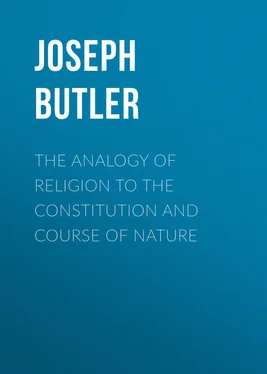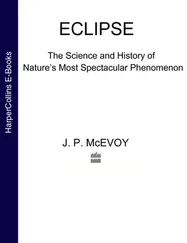Joseph Butler - The Analogy of Religion to the Constitution and Course of Nature
Здесь есть возможность читать онлайн «Joseph Butler - The Analogy of Religion to the Constitution and Course of Nature» — ознакомительный отрывок электронной книги совершенно бесплатно, а после прочтения отрывка купить полную версию. В некоторых случаях можно слушать аудио, скачать через торрент в формате fb2 и присутствует краткое содержание. Жанр: foreign_antique, foreign_prose, на английском языке. Описание произведения, (предисловие) а так же отзывы посетителей доступны на портале библиотеки ЛибКат.
- Название:The Analogy of Religion to the Constitution and Course of Nature
- Автор:
- Жанр:
- Год:неизвестен
- ISBN:нет данных
- Рейтинг книги:3 / 5. Голосов: 1
-
Избранное:Добавить в избранное
- Отзывы:
-
Ваша оценка:
- 60
- 1
- 2
- 3
- 4
- 5
The Analogy of Religion to the Constitution and Course of Nature: краткое содержание, описание и аннотация
Предлагаем к чтению аннотацию, описание, краткое содержание или предисловие (зависит от того, что написал сам автор книги «The Analogy of Religion to the Constitution and Course of Nature»). Если вы не нашли необходимую информацию о книге — напишите в комментариях, мы постараемся отыскать её.
The Analogy of Religion to the Constitution and Course of Nature — читать онлайн ознакомительный отрывок
Ниже представлен текст книги, разбитый по страницам. Система сохранения места последней прочитанной страницы, позволяет с удобством читать онлайн бесплатно книгу «The Analogy of Religion to the Constitution and Course of Nature», без необходимости каждый раз заново искать на чём Вы остановились. Поставьте закладку, и сможете в любой момент перейти на страницу, на которой закончили чтение.
Интервал:
Закладка:
5.) These things are denied to virtue in this life, so that its tendencies, though real, are hindered .
6.) But it may have all requisite advantages hereafter.
– Eternity will be lasting enough.
– Good men will unite; as they cannot do now, scattered over the earth, and ignorant of one another.
– Other orders of virtuous beings will join; for the very nature of virtue is a bond of union.
7.) The tendency of such an order of things, so far as seen by vicious beings in any part of the universe, would be to the amendment of all who were capable of it, and their recovery to virtue.
8.) All this goes to show that the hinderances to virtue are contingent, and that its beneficial tendencies are God’s declarations in its favor.
9.) If the preceding considerations are thought to be too speculative, we may easily come to the same result by reflecting on the supremacy which any earthly nation would attain, by entire virtue for many ages.
Consider now the general system of religion. The government of the world is one; it is moral; virtue shall in the end prevail over wickedness; and to see the importance and fitness of such an arrangement we have only to consider what would be the state of things, if vice had these advantages, or virtue the contrary.
Objec. Why may not things be now going on in other worlds, and continue always to go on in this world, in the same mixed and disordered state as at present?
Ans. We are not proving that God’s moral government is perfect , or the truth of religion, but only seeing what there is in the course of nature, to confirm it, supposing it to be known. Were there nothing to judge by, but the present distribution of pleasure and pain, we should have no ground to conclude that hereafter we should be rewarded or punished exactly according to our deserts. But even then there would be no indication that vice is better than virtue. Still the preceding observations confirm the doctrine of future retribution; for,
1.) They show that the Author of nature is not indifferent to virtue and vice.
2.) That future distributive justice would differ not in kind , but in degree only, from God’s present government. It would be the effect , towards which we see the tendency .
3.) That higher rewards and punishments may be hereafter.
4.) That we should expect it to be so; because the tendencies of vice and virtue are immutable, while the hinderances are only artificial.
[This enumerates the steps of the argument, in the foregoing chapter, in as condensed a form as possible.]
The doctrine of probation comprehends several particulars. But the most common notion is that our future interests are depending ; and depending on ourselves . And that we have opportunities for both good and bad conduct, and temptations to each.
This is not exactly the same as our being under moral government; for it implies allurement to evil, and difficulties in being good.
Hence needs to be considered by itself.
Doctrine. The natural government of God, in this world, puts us on trial as to the things of this world; and so implies, what religion teaches, that his moral government puts us on trial as to a future world.
1.The annexing of pleasures and pains to actions, as good or bad, and enabling us to foresee their effect, implies that our interests, in part at least, depend on ourselves.
2.We often blame ourselves and others for evils, as resulting from misconduct.
3.It is very certain that we often miss possible good, and incur evils, not for want of knowing better, but through our fault .
4.Every one speaks of the hazards of young persons, from other causes than ignorance.
1.In both cases, what constitutes the trial, is either in our circumstances or in our nature.
1.) Some would do right but for violent or extraordinary temptations.
2.) Others will seek evil, and go out of their way after wicked indulgence, when there are no external temptations.
3.) But even those who err through temptation, must have that within which makes them susceptible of temptation.
4.) So that we are in a like state of probation with respect to both present and future interests.
2.If we proceed to observe how mankind behave in both capacities, we see the same analogy.
1.) Some scarcely look beyond the present gratification.
2.) Some are driven by their passions against their better judgment and feeble resolutions.
3.) Some shamelessly go on in open vice.
4.) Some persist in wrong-doing, even under strong apprehensions of future misery.
3.The analogy is no less plain in regard to the influence of others upon us.
1.) Bad example.
2.) Wrong education.
3.) Corruptions of religion.
4.) General prevalence of mistakes as to true happiness.
4.In both cases negligence and folly bring difficulty as well as vice.
This disadvantage affords no ground of complaint; for,
1.We may manage to pass our days in comfort and peace.
2.And so may we obtain the security and comfort of religion.
3.We might as well complain that we are not a higher order of beings.
1.It is thus proved that the state of trial, which religion says we are in, is credible; for it exactly corresponds to what we see.
1.) If from birth till death we were in a constant security of enjoyment, without care or correctness, it would be a presumption against religion.
2.) It might, if we had no experience, be urged that an infinitely good Being would not expose us to the hazard of misery. This is indeed a difficulty, and must remain so; but still the course of nature is as it is.
3.) The miseries which we bring on ourselves are no more unavoidable than our deportment.
2.It has been proved that we are in danger of miscarrying as to our interests, both present and future.
3.The sum of the whole is, that as we do not have present enjoyments and honors forced upon us, in spite of misconduct, so this may be the case, as to that chief and final good which religion proposes.
Why we should be placed in the condition spoken of in the last chapter, is a question which cannot be answered. It may be that we could not understand, if told. And if we could, it might injure us to know, just now. It certainly is consistent with God’s righteous government.
Religion tells us that we are so placed in order to become qualified for a better state.
This, though a very partial answer to the inquiry why we are so placed, answers an infinitely more important question, – viz.: What is our business here?
1.Every creature is designed for a particular way of life.
Читать дальшеИнтервал:
Закладка:
Похожие книги на «The Analogy of Religion to the Constitution and Course of Nature»
Представляем Вашему вниманию похожие книги на «The Analogy of Religion to the Constitution and Course of Nature» списком для выбора. Мы отобрали схожую по названию и смыслу литературу в надежде предоставить читателям больше вариантов отыскать новые, интересные, ещё непрочитанные произведения.
Обсуждение, отзывы о книге «The Analogy of Religion to the Constitution and Course of Nature» и просто собственные мнения читателей. Оставьте ваши комментарии, напишите, что Вы думаете о произведении, его смысле или главных героях. Укажите что конкретно понравилось, а что нет, и почему Вы так считаете.












